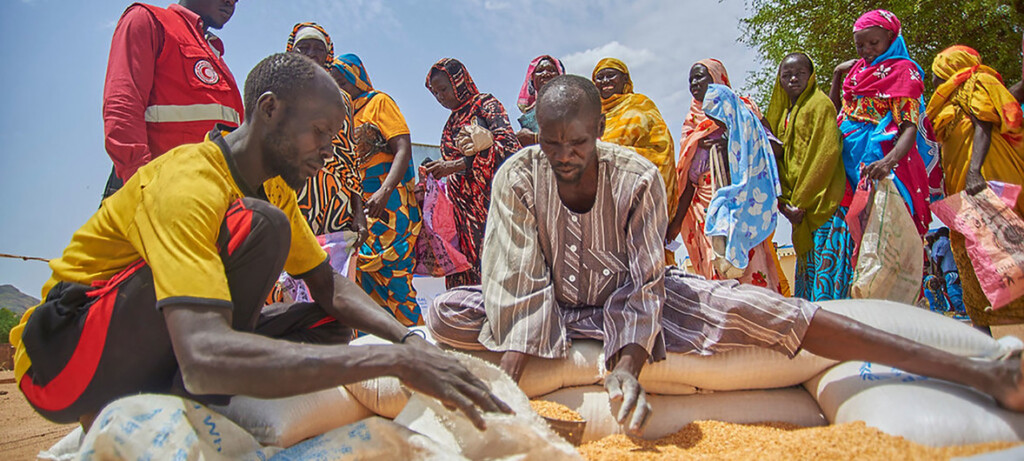HAC: ‘Vital aid convoys reach West Darfur from Chad’

WFP food distribution to displaced people in Kadugli, South Kordofan (File photo: OCHA/Sari Omer)
Convoys of 60 lorries carrying humanitarian aid crossed the border from Adré in eastern Chad into West Darfur as of Thursday, at the request of relief organisations, the Sudanese Humanitarian Aid Commissioner Salwa Adam says. This follows an announcement by the Sudanese government on March 6 that a number of land border crossings, and several airports, could be used as corridors for humanitarian aid. The borders were previously closed to traffic, the Sudanese Armed Forces (SAF) citing concerns that they would be used as conduits to supply the opposing paramilitary Rapid Support Forces (RSF).
During a meeting with UN refugee agency (UNHCR) in Port Sudan yesterday, she said that the government takes humanitarian relief operations seriously, stressing its commitment to the entry of aid through the agreed crossings.
The Sudanese authorities have identified a number of land border crossings for the entry of aid, including El Tina crossing in north Darfur, and Renk in South Sudan, as well as the airports of El Fasher in North Darfur, El Obeid in North Kordofan, and Kadugli in South Kordofan.
Adam stressed “the need for aid to reach every citizen in areas controlled by the Sudanese Armed Forces (SAF) or the Rapid Support Forces (RSF)” and called on international organisations to bring in humanitarian aid, especially after the opening of the crossings.
Lt Gen Abdelfattah El Burhan, commander of the SAF, who is also head of Sudan’s Sovereignty Council, earlier announced his refusal to allow aid to enter the areas controlled by the RSF, which sparked widespread condemnation.
However, the humanitarian aid commissioner stressed: “We work in the humanitarian field and have nothing to do with politics.”
Spectre of famine
Large parts of Darfur are witnessing severe hunger, with people desperately appealing to international organisations to intervene urgently.
Residents of the Mukjar camp for displaced people in Central Darfur renewed their demand for speedy provision of aid.
Women told Radio Dabanga from the camp that they all suffer from the lack of food. They begged for “searching for appropriate ways to deliver aid, and if possible resorting to dropping food by air, similar to what happened in other areas if aid could not reach by land, to prevent us dying from hunger”.
Displaced people in Kass, South Darfur, reported dire humanitarian and health conditions due to the lack of food, medicine and health care.
Abdelmonim Adoma told Radio Dabanga that “all humanitarian work has stopped in the area of Kass since the outbreak of the war in April last year. In addition, a large number of people who fled the fighting in Nyala and other cities are now sheltering in schools and with relatives in the town. The latrines are full and need to be suctioned and there are no aids for this.
Adam said that the meeting with the UNHCR came in the context of tightening and coordinating efforts between United Nations agencies working in the humanitarian field in Sudan and international voluntary organisations and the federal Humanitarian Aid Commission (HAC) “which is the responsible body entrusted with managing humanitarian affairs in the country”.
She explained that HAC is committed to providing all facilities to organisations working in humanitarian affairs as the only body allowed to deal with international organisations, in accordance with Sovereignty Council Resolution No. 364 that subordinates the states’ humanitarian aid commissions to the federal HAC.
She further stressed the need “to unify the media platforms and join efforts in order to reach real and correct information. We will work to overcome obstacles for media professionals to easily provide them with information.”
The humanitarian commissioner appealed to the international community to do more to bring to the urgent needs and those affected.











 and then
and then